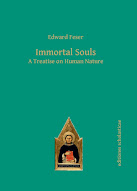Previous open threads archived here.
Tuesday, December 31, 2024
The thread you’ve been waiting for
Saturday, December 28, 2024
Boczar on Immortal Souls
“The book's title is an homage to David Hume, and Feser has certainly taken Hume to task, giving cogent arguments for the reality of the self (chapter 2), freedom of the will (chapter 4), immateriality of the intellect (chapter 8), and more…
It is with contemporary developments in the philosophy of mind where Feser is at his best, and readers will not be disappointed with his critique of positions such as Buddhism's no-self doctrine (chapter 2)…
Feser again is at his best in cogently establishing the immateriality of the intellect. He puts forth various arguments. His most powerful argument is a modified version of James Ross's argument from the indeterminacy of the physical (chapter 8)… One of the unique contributions that Feser makes to contemporary literature is his defense of the immateriality of the intellect from its simplicity (chapter 8). Readers should pay close attention to this powerful argument.”
Wednesday, December 18, 2024
Gilson on philosophy and its history
Monday, December 16, 2024
Nicholson on Immortal Souls
"As its title suggests, Immortal Souls by Edward Feser provides a robust philosophical defense of the immortality of the soul. The scope of the book reaches far beyond this one topic, however, as Feser methodically exposits and defends the entire Aristotelian-Thomist metaphysics of the human person, addressing in depth such topics as personal identity, freedom of the will, perception and cognition, phenomenal consciousness, and artificial intelligence. The result is an extraordinarily comprehensive and detailed sweep through contemporary philosophy of mind, addressing nearly every major topic of interest. Feser makes a forceful case that Thomism remains a live option, able to resolve many seemingly intractable problems at the intersection of philosophy and the sciences of cognition…
Wednesday, December 4, 2024
Full interview on Pints with Aquinas
Monday, December 2, 2024
Pints with Aquinas interview (Updated)
Wednesday, November 27, 2024
Zubia on Hume and liberalism
Tuesday, November 26, 2024
Popper’s via negativa
Monday, November 18, 2024
Advice to Christian Philosophers
Monday, November 11, 2024
Pro-lifers must resist Trump on abortion and IVF
Many pro-life Trump supporters will be shocked and angered at such a statement. But I urge them to resist this emotional reaction and dispassionately consider the cold, hard facts. Trump supports preserving access to the abortion pill, which is responsible for the majority of abortions in the United States. Since these pills can be sent by mail into states where abortion is restricted or banned, preserving such access largely undermines recent state-level pro-life measures. Trump also actively opposes those measures in any event, insisting that they are “too tough” and need to be “redone.” He has repeatedly said that, even at the state level, abortion must remain legal beyond six weeks. And he wants the federal government to pay for, or to force insurance companies to pay for, in vitro fertilization (IVF) treatments – a practice that results in the destruction of more human embryos than even abortion does. The only threat to the unborn Trump has clearly and consistently opposed is late-term abortion, which accounts for a mere 1% of abortions. In short, the policies Trump favors would prevent very few abortions and encourage the discarding of millions of embryos. True, Trump is much better than Harris in supporting the rights of pro-lifers. But he is now only a little better in upholding the rights of the unborn.
Sunday, October 27, 2024
Progressive Catholics and capital punishment
Monday, October 21, 2024
Augustine, liberalism, and political polarization
Tuesday, October 8, 2024
Immortal Souls now available
Immortal Souls provides as ambitious and complete a defense of Aristotelian-Thomistic philosophical anthropology as is currently in print. Among the many topics covered are the reality and unity of the self, the immateriality of the intellect, the freedom of the will, the immortality of the soul, the critique of artificial intelligence, and the refutation of both Cartesian and materialist conceptions of human nature. Along the way, the main rival positions in contemporary philosophy and science are thoroughly engaged with and rebutted.
Friday, October 4, 2024
Abortion and subsidiarity
Tuesday, October 1, 2024
Vinco on Feser in Philosophische Rundschau
Wednesday, September 25, 2024
The latest on Immortal Souls
Tuesday, September 24, 2024
The new Aquinas 101
Sunday, September 22, 2024
The popesplainer’s safety dance
If you start arguing, “My religion is more important than
yours,” or “Mine is the true one, yours is not true,” where does this lead? Somebody answer. [A young person answers, “Destruction”.] That is correct. All religions are paths to God. I will use an analogy, they are like different
languages that express the divine. But
God is for everyone, and therefore, we are all God’s children. “But my God is more important than yours!” Is this true? There is only one God, and religions are like
languages, paths to reach God. Some
Sikh, some Muslim, some Hindu, some Christian.
As the article from which I quote this passage notes, while the Vatican’s initial English translation of the pope’s words attempted to sanitize them, it was later corrected to make it clear that this is indeed what the pope said. And what he said flatly contradicts traditional Catholic teaching. Francis criticizes those who take one religion to be the true or most important one, and implies that Christianity, Islam, Hinduism, Sikhism, etc. are as equal as different languages are.
Sunday, September 15, 2024
Trump: A buyer’s guide
Sunday, September 1, 2024
The problem with the “hard problem”
Monday, August 19, 2024
Rawls’s liberal integralism
Saturday, August 10, 2024
Trump has put social conservatives in a dilemma
Despite his recent betrayal of social conservatives, Donald Trump remains less bad on these issues. Indeed, his appointments to the Supreme Court made possible the overturning of Roe v. Wade. It is understandable that many social conservatives have concluded that, his faults notwithstanding, they must vote for him in order to prevent a Harris/Walz victory. The argument is a serious one. But the matter is not as straightforward as they suppose, because the problem is not merely that Trump will no longer do anything to advance the pro-life cause. It is that his victory would likely do positive harm, indeed grave and lasting damage, to the pro-life cause and to social conservatism in general.
Tuesday, August 6, 2024
Damnation roundup
These are extremely grave delusions which, by fostering complacency, are sure to add to the number of the damned. In reality, there is no reasonable hope whatsoever that all are saved. The relevant philosophical and theological considerations make this conclusion unavoidable. I have addressed these issues in some depth in many articles over the years, and it seemed to me a good idea to collect them in one place for readers who might find that useful.
Wednesday, July 24, 2024
Word on Fire Institute course
Saturday, July 20, 2024
More on the GOP and social conservatism
For those not following me on X (Twitter), some posts from the last couple of days attempting further to clarify what is at issue, and at stake, in the debate over the direction of the GOP:
Wednesday, July 17, 2024
Now is the time for social conservatives to fight
Readers who follow me on X (Twitter) will know of the intense debate occurring there over the last week between social conservatives critical of Trump’s gutting of the GOP platform and those defending it. A pair of bracing, must-read articles at First Things and National Review recount how pro-lifers were brazenly shut out of the platform process. For social conservatives to acquiesce out of partisan loyalty would be to commit assisted political suicide. Today I posted the following, which elaborates on considerations I raised in an earlier article:
A brief memo
to social conservatives worried that criticism of the GOP will cost it votes,
and who claim that the critics are politically naïve:
First, yes,
criticism could cost the party votes. That’s precisely the point. The party could
lose votes IF, in the months remaining before the election, it does not try seriously
to meet the concerns of social conservatives. In particular, the GOP must be
made to see that it cannot take their votes for granted. And the party must do
something to make up for the appalling injustice that was done to social
conservatives during the platform process, as recounted in the First Things article linked to.
Second, it
is not the critics, but those who urge their fellow social conservatives to
keep their mouths shut, who are politically naïve. The only thing politicians
can be relied on to respond to is the prospect of losing votes or losing money.
If the GOP fears that it might lose the votes or financial contributions of a
critical mass of social conservatives, it will have to take their concerns
seriously. If, instead, social conservatives acquiesce to what has happened
rather than fighting back, the party will have no incentive to try to address
their concerns in the future – and every incentive not to do so, given the
unpopularity of social conservatism in the culture at large.
The stakes are high, and that is precisely why social conservatives must raise the alarm NOW, while they might still influence the direction of the party, not in some fantasy post-election future. The actual political reality is that if the GOP wins, having thrown social conservatives under the bus without any pushback from them, the party will draw the lesson that it no longer needs to worry about them or their concerns.
Sunday, July 14, 2024
Fight, yes, but for what?
Friday, July 12, 2024
The future of the Magisterium
Thursday, July 11, 2024
Rawls on religion
Saturday, June 29, 2024
Hobbes and Kant on capital punishment
Friday, June 21, 2024
Immortal Souls in eBook format
Tuesday, June 18, 2024
Scruton on tradition
Modern liberals tend to scoff at the idea of tradition. All traditions, they tell us, are “invented,” implying that they can therefore be replaced with impunity. This idea is plausible only if you take the trivial examples – Scottish country dancing, Highland dress, the Coronation ceremony, Christmas cards, and whatever else comes with a “heritage” label. A real tradition is not an invention; it is the unintended byproduct of invention, which also makes invention possible… [A] tradition, precisely because it is not invented, has authority. “Unintended byproducts” of invention contain more knowledge than any person can discover unaided.
Friday, June 7, 2024
Immortal Souls now available for pre-order
Immortal Souls provides as ambitious and complete a defense of Aristotelian-Thomistic philosophical anthropology as is currently in print. Among the many topics covered are the reality and unity of the self, the immateriality of the intellect, the freedom of the will, the immortality of the soul, the critique of artificial intelligence, and the refutation of both Cartesian and materialist conceptions of human nature. Along the way, the main rival positions in contemporary philosophy and science are thoroughly engaged with and rebutted.
Wednesday, June 5, 2024
Postliberalism is not despotism
Saturday, June 1, 2024
Multiverses and falsifiability
Thursday, May 30, 2024
Update on Immortal Souls
Immortal Souls has at last been reduced from potency to act. The official publication dates are in June for Europe and July in the United States. Pre-order is now possible at Amazon’s websites in the U.K. and in Germany. It should be available for pre-order soon at Amazon’s U.S. website, and I’ll let you know when it is. You can find the table of contents and endorsements here, and other details at the publisher’s web page.
Wednesday, May 22, 2024
New video course at Word on Fire
Tuesday, May 14, 2024
Immortal Souls
Immortal Souls provides as ambitious and complete a defense of Aristotelian-Thomistic philosophical anthropology as is currently in print. Among the many topics covered are the reality and unity of the self, the immateriality of the intellect, the freedom of the will, the immortality of the soul, the critique of artificial intelligence, and the refutation of both Cartesian and materialist conceptions of human nature. Along the way, the main rival positions in contemporary philosophy and science are thoroughly engaged with and rebutted.
Friday, May 10, 2024
Let’s open it up
Saturday, May 4, 2024
Dignitas Infinita at The Catholic Thing
Monday, April 29, 2024
Plato and Aristotle on youth and politics
Friday, April 19, 2024
Daniel Dennett (1942-2024)
Saturday, April 13, 2024
Mansini on the development of doctrine
Thursday, April 11, 2024
Two problems with Dignitas Infinita
Wednesday, April 10, 2024
Western civilization's immunodeficiency disease
Tuesday, April 2, 2024
Ed Piskor (1982-2024)
The illusion of AI
Friday, March 29, 2024
Wishful thinking about Judas
Jesuit Britain?
Monday, March 25, 2024
Mind, matter, and malleability
Friday, March 15, 2024
The metaphysics of individualism
Traditionally, in Catholic philosophy, a person is understood to be a substance possessing intellect and will. Intellect and will, in turn, are understood to be immaterial. Hence, to be a person is ipso facto to be incorporeal – wholly so in the case of an angel, partially so in the case of a human being. And qua partially incorporeal, human beings are partially independent of the forces that govern the rest of the material world.


















































